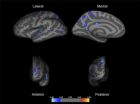New information about how neurons act could lead to brain disorder advancements
Neurons actively 'fine tune' for electrical imbalances at the genetic level, MU research finds
2014-10-14
(Press-News.org) COLUMBIA, Mo. – Neurons are electrically charged cells, located in the nervous system, that interpret and transmit information using electrical and chemical signals. Now, researchers at the University of Missouri have determined that individual neurons can react differently to electrical signals at the molecular level and in different ways—even among neurons of the same type. This variability may be important in discovering underlying problems associated with brain disorders and neural diseases such as epilepsy.
"Genetic mutations found in neurological disorders create imbalances in the inward and outward flow of electrical current through cells," said David Schulz, associate professor in the Division of Biological Sciences in the College of Arts and Science and a researcher in the Interdisciplinary Neuroscience Program at MU. "Often, neurons react to electrical signals, or voltage, and compensate by altering their own electrical outputs. The variability in these imbalances, even among multiple cells of the same kind within the brain, is one of the major problems scientists face when trying to design therapeutics for disorders like epilepsy. Seizures in individuals can be caused by different imbalances—therefore getting to the root of how neurons act individually makes our studies important."
Schulz and his team previously proved that two identical neurons can reach the same electrical activity in different ways. In his new study, Schulz hypothesized that neurons might use the cell's genetic code, or its messenger RNA (mRNA), to "fine tune" the production of proteins, helping individual cells react accordingly.
Using clusters of neurons obtained from Jonah crabs, Schulz and his team experimentally altered electrical input and output in the neurons and measured the messenger RNA (mRNA) levels found within the cells. Invertebrates like crabs are useful in neuroscience research because their neurons are simple enough to observe and study, but advanced enough that they can be "scaled up" to apply to higher organisms, Schulz said.
They found that when normal patterns of stimulation were maintained, cells engaged the correct ratios of mRNA to produce the proteins needed to help keep electrical impulses in order; however, when normal patterns of activity were not maintained, this fundamentally changed the cells at the molecular level.
"We were the first to show that the correct ratios of mRNAs are actively maintained by the actual activity or voltage of the cell, and not chemical feedback," Schulz said. "These results represent a novel aspect of regulation that might be useful for developing therapeutics for neuronal disorders later."
INFORMATION:
Schulz' study, "Activity-dependent feedback regulates correlated ion channel mRNA levels in single identified motor neurons," was published in the August 18th edition of Current Biology.
Editor's Note: For a longer version of this story, please visit: http://biology.missouri.edu/news/new-study-finds-that-neurons-actively-fine-tune-themselves-at-the-genetic-level/
[Attachments] See images for this press release:


ELSE PRESS RELEASES FROM THIS DATE:
2014-10-14
Under the rule of dictator Nicolae Ceausescu, thousands of Romanian children were placed in overcrowded orphanages with bleak conditions and minimal human contact. Even after the 1989 revolution, the legacy of institutionalization continued. Only recently has research and public concern over early childhood environments caused changes in policies.
University of Washington research on children who began life in these institutions shows that early childhood neglect is associated with changes in brain structure. A paper published this month in Biological Psychiatry shows ...
2014-10-14
LEBANON, NH – The foundation of evidence-based research has eroded and the trend must be reversed so patients and clinicians can make wise shared decisions about their health, say Dartmouth researchers in the journal Circulation: Cardiovascular Quality and Outcomes.
Drs. Glyn Elwyn and Elliott Fisher of The Dartmouth Institute for Health Policy & Clinical Practice are authors of the report in which they highlight five major problems set against a backdrop of "obvious corruption." There is a dearth of transparent research and a low quality of evidence synthesis. ...
2014-10-14
Researchers at Lund University in Sweden are testing a treatment for type 2 diabetes which targets the disease mechanism itself - and not just the symptoms. For the first time, knowledge about the individual patient's genetic risk profile is being used. The treatment completely restores the capacity to secrete insulin, which is impaired by the risk gene.
"The concept of treatment personalised to the individual's risk profile has great potential. Our results show that it is possible to block the effects of a common risk gene for type 2 diabetes", says Anders Rosengren, ...
2014-10-14
Scientists from the University of York have released a report highlighting the gap between declining wild fish supplies and healthy eating advice recommending more seafood.
While the health benefits of eating fish have become better appreciated in recent years, many wild fish stocks continue to be overfished.
In a study published in Marine Pollution Bulletin, Dr Ruth Thurstan, now a Research Fellow at the University of Queensland, and Professor Callum Roberts, Professor of Marine Conservation at the University of York, used historical fisheries data and population ...
2014-10-14
The results of their research have been published as the cover story of the renowned medical journal Cancer Cell.
Fatty liver disease – alongside fatty liver due to massive alcohol consumption – is mainly caused by excessive consumption of fat and sugar combined with a lack of exercise or a sedentary life style. This is referred to as non-alcoholic fatty liver disease (NAFLD). If NAFLD becomes chronic – e.g. through the constant uptake of high lipids and high sugar combined with lack of excercise a chronic inflammatory response is triggered in the liver ...
2014-10-14
This news release is available in German. FRANKFURT Parkinson's Disease is the second most common neurodegenerative disorder. In Germany alone, almost half a million people are affected. The focus of the disease is the progressive degeneration of dopamine-producing nerve cells in a certain region of the midbrain, the substantia nigra. Misfolded proteins are the cause. Until recently, it was unclear why damage is confined to specific nerve cells. A team or researchers led by Frankfurt neurophysiologists has now defined how this selective disease process begins using ...
2014-10-14
From an early age, the lungs of individuals with cystic fibrosis (CF) are colonised and infected by bacteria, a common example being S. aureus. These bacterial infections cause the lungs to become inflamed, infected, and can eventually lead to permanent lung damage. Researchers from the University of Pennsylvania and the Howard Hughes Medical Institute previously showed that an enzyme called Sphingomyelin phosphodiesterase C (SMaseC) produced by the S. aureus bacterium may harm the health of CF patients. Now, they have discovered an inhibitor for this pathogenic bacterial ...
2014-10-14
Just two hours of extra physical activity each week can improve school performance. This has been shown by a study of approximately 2,000 twelve-year-olds carried out by scientists at the Sahlgrenska Academy, University of Gothenburg.
The scientists Lina Bunketorp Käll, Michael Nilsson and Thomas Linden, at the Centre for Brain Repair and Rehabilitation at the Sahlgrenska Academy, University of Gothenburg, have tested the hypothesis that increased physical activity stimulates learning and improves school performance.
In the study, published in the scientific periodical ...
2014-10-14
Wherever you are right now: squeeze your glutes. Feel that? You just also contracted your pelvic floor too, whether you wanted to or not.
Scientists studying the source of chronic abdominal and pelvic floor pain found an unexpected connection in the brain between the pelvic floor – the muscle responsible for, among other things, keeping you from peeing your pants – and various muscles throughout the body. They've found some evidence for a link as far away as the toes (try tapping a toe and see if you feel the clench), but the strongest link so far is with ...
2014-10-14
WASHINGTON, Oct. 14, 2014—Astronomers Chih-Hao Li and David Phillips of the Harvard-Smithsonian Center for Astrophysics want to rediscover Venus—that familiar, nearby planet stargazers can see with the naked eye much of the year.
Granted, humans first discovered Venus in ancient times. But Li and Phillips have something distinctly modern in mind. They plan to find the second planet again using a powerful new optical device installed on the Italian National Telescope that will measure Venus' precise gravitational pull on the sun. If they succeed, their first-of-its-kind ...
LAST 30 PRESS RELEASES:
[Press-News.org] New information about how neurons act could lead to brain disorder advancements
Neurons actively 'fine tune' for electrical imbalances at the genetic level, MU research finds




